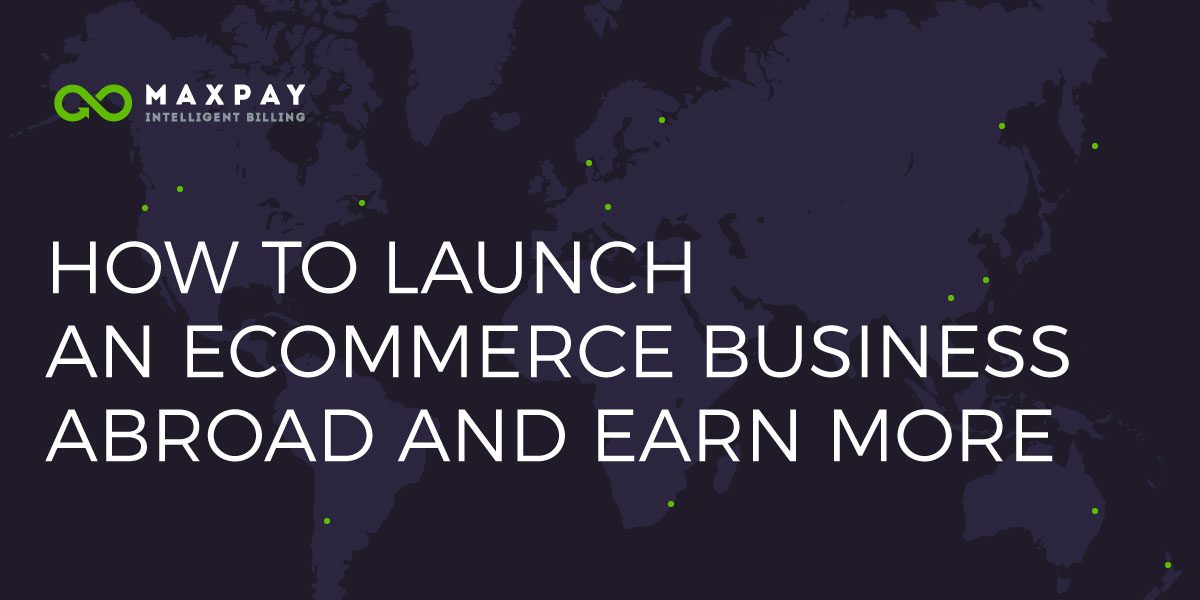How to Launch an Ecommerce Business Abroad and Earn More

The legal aspects
Anye-commercee project is based on internet acquiring – a service by which a business operating online can accept payments, usually from an end user’s payment card. Given how easy it has now become to incorporate virtually any company in virtually any jurisdiction, the corporate structure should be built around acquiring.
What does this mean?
From the legal point of view, the structure of a company (legal entity) is a tool with a specific function. When creating a corporate structure for any business, a lawyer selects and uses solutions that enable the business to perform efficiently and to grow.
Mistakes made when incorporating a company can cost dearly and prevent the business from selling its services abroad by restricting its acquiring tools. At best, the merchant will be unable to open an account and will have to incorporate a new company in a suitable jurisdiction with the required structure. At worst, the merchant’s company will be accepted, but the service will come with higher commissions and the company will be losing money for several years due to higher fees.
Choosing a jurisdiction and restrictions on acquiring
A jurisdiction (in simple terms) is a country or territory with its own legal system. For example, Hong Kong, various US states and some special economic zones in the UAE are all jurisdictions. Companies are incorporated in a jurisdiction on the basis of regulations that are applied there. By choosing a jurisdiction you are simultaneously choosing where the company will be incorporated and what kind of company it will be.
Choosing the right jurisdiction is both an important start and half the battle
The choice of jurisdiction influences which banks will be able to provide acquiring services for transactions. This is because the laws of various countries and the rules of individual payment systems restrict the acquiring bank’s ability to work with foreign companies. Thus, acquirers from the EU can only serve companies incorporated in the EU, and American banks predominantly serve businesses incorporated in the US. So a company incorporated in Hong Kong will simply be unable to work directly with a European acquiring bank.
Payments cannot be made from a merchant account in the same way as they are from a settlement account: a merchant account can only be used to accumulate funds received from cards. To gain access to funds in a merchant account they have to be transferred to a settlement account. This usually happens once a week.
In addition, whereas in the past a company could open a merchant account in the EU and a current account outside the EU, the rules in this area have now been tightened up. European acquirers can only make payments to settlement accounts within the EU.
Before incorporating a company it is important to analyze the structure of the traffic to understand where the main customer flow is from and to take this into account when choosing an acquiring partner.
The company (corporate structure) is chosen to fit the type of acquirer. But an acquirer also has to be chosen. This choice is driven by the nature of the business: where your clients are and where the traffic and payments will come from.
For example, if a business mainly serves users in the USA, an acquirer in the USA or Canada should be selected. If an American user tries to make a card payment to a merchant account opened in the EU it is likely that his transaction will be blocked by the risk departments of his issuing bank.
European acquiring has a high success rate for transactions within the region. For example, if somebody in France buys something via a website with acquiring in France, the issuing banks will have no issues with the transaction as there is nothing suspicious about someone from France buying something in a French shop. But if the acquiring is provided by, for instance, a Chinese, American, Hong Kong or any other bank that is exotic for the European region, the issuing bank’s risk department may consider the transaction suspect and block it.
Risk assessment
Every acquirer specializes in specific types of business in which it knows how to assess the risks and can decide whether or not it is willing to serve a company.
Some businesses carry fewer risks, and some more. It is harder for companies working in more high-risk sectors to find an acquiring bank. For example, if a company sells dietary supplements online it will not be able simply to go to any bank and apply to open a merchant account. The acquirer will refuse, simply because it lacks the competence to assess the extent of risk associated with serving that customer. The merchant, therefore, needs to find a bank that specializes in its type of business.
Company management
Banks place even more rigorous demands on company management.
For instance, an acquirer from the EU will open a merchant account only if the company is formally and actually managed by a resident of the European Union. He or she must not be a nominal director nor work for another 100 companies. If the bank comes across any such information it will reject the company. A director must be professional – in other words, unique.
Furthermore, VISA and MasterCard have de facto “nominee blacklists” (VMAS for VISA and MATCH for Master Card). If it turns out that one of a “nominee’s” companies is engaged in gambling under the guise of a drapery shop, its account will be closed and the director and principal owner will be added to the blacklist. Almost automatically, merchant accounts can then be closed for other clients who have used the services of the “nominee”, even if they haven’t broken the rules of the bank and associations, together with the company’s accounts with other acquirers.
The shareholder structure is also important.
Acquirers are also more understanding if the shareholders of an American company are US residents and those of a European company are EU residents.
Structuring the business
Where a group of companies is concerned, for the business to function normally it needs to be divided into several legal entities and correctly structured, with a division of responsibilities and risks.
There are particular aspects to the structuring of an IT business connected, amongst other things, with the way acquiring works. To properly structure such a business you need to specialize specifically in IT.
This is a mistake that frequently affects clients who apply to law firms with little knowledge of the specifics of international structuring, or – and sometimes the consequences of this can be even worse – to law firms that specialize in structuring other sectors of the economy, such as international trade in commodities. Such companies may even realize their mistake but continue leading their clients along to keep the businesses.
In addition, even if an IT business is not working with acquiring at this stage, it still doesn’t mean that it can be structured like any industrial holding company. IT structures really do have many specific features: from the predominance of offshore jurisdictions for handling relations with investors to resolving issues around safety and interaction with multitudes of self-employed contractors.
Technical capability
Make sure that your acquirer has the technical capability to work with you.
Not all banks have sufficiently advanced technical systems. Even if a bank is suitable in terms of its legal and other characteristics, there is no guarantee that it will be able to service the company. Some financial institutions can perform acquiring, but they need processing and a payment gateway, while others perform only acquiring. This means that a settlement account, without which you won’t be able to start processing either, will have to be opened somewhere else. They then work with other companies or recommend them to the client.
So where do you start?
There are some guidelines for anyone planning to open a company abroad and sell their services to foreign clients.
When choosing a jurisdiction, start by analysing your traffic and the acquiring banks’ ability to work with your business. You can get help in choosing the right acquiring tools from specialists who spend all of their time doing just that, as things in this areas are changing quickly, laws are being tightened up, and what was appropriate one month ago may not be the best choice today. Choose partners that specialize specifically in your field of business.
